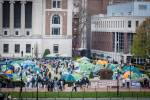Lack of sleep interferes with your brain reading facial expressions

BERKELEY, California — If you often find yourself trying to joke around with someone who is in tears, you may not be getting enough sleep.
That‘s because a lack of sleep hinders the brain‘s ability to recognize and process the facial expressions of others, according to a new study, published in the Journal of Neuroscience this week, from the University of California, Berkeley. When you lose that discernment, you could be putting yourself and those around you at risk.
"Recognizing the emotiineronal expressions of someone else changes everything about whether or not you decide to interact with them, and in return, whether they interact with you," said senior study author and Berkeley neuroscience professor Matthew Walker in a release.
The study focused on 18 healthy young adults who were twice asked to examine and identify 70 facial expressions from across the board: friendly, happy, scared and angry, to name a few. The first viewing took place after participants had received a full night‘s sleep, while the second happened after they‘d been awake for 24 hours.
Meanwhile, researchers conducted brain scans and monitored heart rates throughout both viewings. Those scans revealed sleep-deprived participants could not distinguish between threatening and friendly facial expressions, nor did their heart rates respond appropriately to the two types of expressions.
"Consider the implications for students pulling all-nighters, emergency room medical staff, military fighters in war zones and police officers on graveyard shifts," said co-author Andrea Goldstein-Piekarski.
Perhaps most troubling: Researchers found that the neural link between the brain and the heart — a tool that helps the body sense distress signals — was disconnected in those who didn‘t sleep.
"Sleep deprivation appears to dislocate the body from the brain," Walker said. "You can‘t follow your heart."
Not good news, Walker said, considering two-thirds of Americans don‘t get enough sleep. Walker and his team also found participants were more likely to identify friendly or neutral facial expressions as threatening when sleep deprived.
"Insufficient sleep removes the rose tint to our emotional world, causing an overestimation of threat," he said. "This may explain why people who report getting too little sleep are less social and more lonely."
On the other side of the spectrum, Walker and his colleagues found that while sleep deprivation robs the brain of the ability to read facial expressions, quality dream sleep can heighten that ability.
"The better the quality of dream sleep, the more accurate the brain and body was at differentiating between facial expressions," Walker said. "Dream sleep appears to reset the magnetic north of our emotional compass."
All the more reason to skip that episode of your favorite Netflix show and turn in at a decent hour.


















